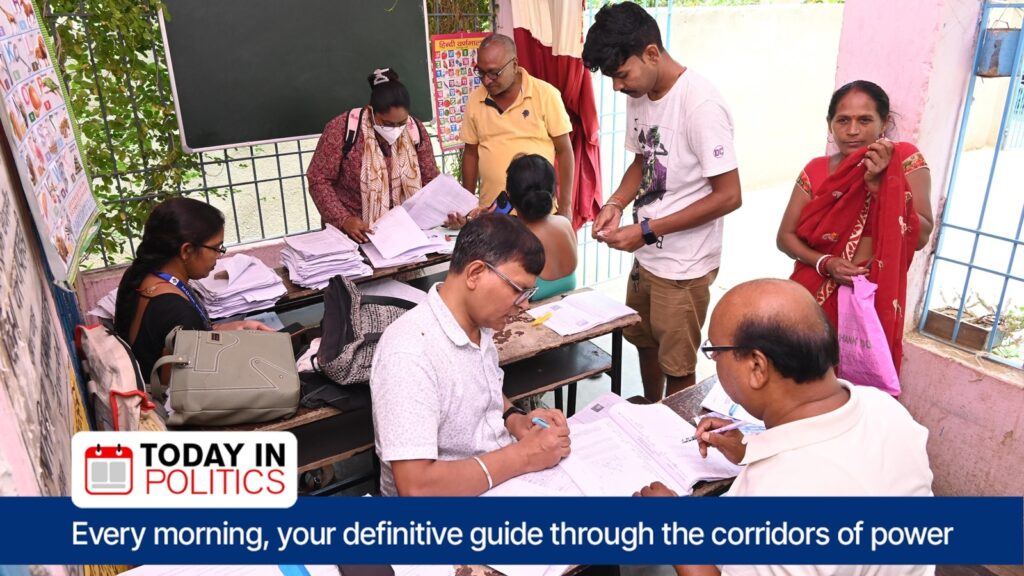The first phase of the Special Intensive Revision (SIR) of Bihar’s electoral rolls concluded on Friday and the Election Commission (EC) said about 92% of 7.89 crore registered voters in the state would remain on the draft rolls to be published on August 1.
About 8%, or approximately 65 lakh names, are likely to be removed from the draft rolls after they were found to be either deceased, registered in more than one place, permanently migrated to another place, or untraceable, according to the EC.
The poll panel said 7.23 crore electors had submitted their forms, approximately 22 lakh of the electors were found to have passed away, an estimated 7 lakh were registered in more than one location, and approximately 35 lakh had either permanently migrated or could not be traced. This accounts for 99.8% of the total electors. The forms of 1.2 lakh electors had not been received till Friday evening, the EC said.
The list of those who had not submitted their forms or were found to have either died or migrated had been shared with 12 national and state parties, the poll body said.
While the names of 65 lakh electors are expected to be removed in the first phase, the final roll scheduled to be published on September 30 could see further deletions as electors’ documents have not yet been taken into account. Those whose names do not make it to the draft can also appeal in the claims-and-objections phase, which will run from August 1 to September 1, and make it to the final list.
The EC on June 24 announced the voter-verification drive in Bihar, where Assembly elections are due to be held later this year. The EC had said only those electors whose forms were received by July 25 would be included in the draft roll. In addition to the forms, those added to the rolls after January 1, 2003, are required to submit documents from a list of 11 specified by the poll body, establishing their eligibility to be electors, that is, age and citizenship.
Though the “detailed guidelines” issued along with the June 24 order said the electors would have to submit the documents along with their forms, the poll panel clarified on July 6 that the electors could submit their documents in the claims-and-objections period.
Story continues below this ad
A batch of petitions has been filed in the Supreme Court challenging the SIR exercise.
The Indian Express has published a series of reports on the sense of unease that the SIR exercise triggered in Bihar, from voters belonging to the Extremely Backward Classes and minority communities to the upper castes. This unease was palpable from Chief Minister Nitish Kumar’s turf in Nalanda and RJD chief Lalu Prasad’s Raghopur in Vaishali to Muslim-dominated Seemanchal.
Justice Varma notice
The notice for removal of Justice Yashwant Varma is likely to be taken up in the Lok Sabha, with that “received” by former Vice President Jagdeep Dhankhar in the Rajya Sabha unlikely to be considered.
The announcement by Dhankhar, as Chairman of the Rajya Sabha, that he had “received” a notice for the removal of Justice Varma from 63 Opposition MPs is believed to have triggered the series of events leading to his resignation as VP.
Story continues below this ad
Speaking to reporters on Friday, Parliamentary Affairs Minister Kiren Rijiju said: “All the political parties have agreed that the removal of Justice Yashwant Verma has to be a joint call. Now there should be no issue with regard to which House it has to be moved. Once we have agreed that it will be moved in the Lok Sabha… it will be concurred in the Rajya Sabha as per rule… So we should not remain under any doubt that the discussion and the motion, everything, will begin in the Lok Sabha, and the Rajya Sabha, as per rule, will give concurrence and there will be a thorough discussion in the Rajya Sabha also.”
This was decided by consensus among all parties, Rijiju emphasised.
While presiding over the Rajya Sabha Monday, hours before he resigned, Dhankhar said he had “received a notice of motion” from the Opposition for constituting a statutory committee for removal of Justice Varma. He added: “I direct the Secretary General to find out whether a similar motion has been moved in the House of People, the Lok Sabha… This is being done for the purpose that under the Judges Inquiry Act, 1968, the procedure (in such a case) is different.”
Under the Act, if a notice to remove a judge is presented in both the Houses of Parliament on the same day, then the committee for inquiry is to be constituted jointly by the Speaker of the Lok Sabha and the Chairman of the Rajya Sabha. Since Dhankhar’s resignation, the post of Chairman is vacant.
Story continues below this ad
Goa Governor
Former Union minister Ashok Gajapathi Raju will be sworn in as the new governor of Goa on Saturday in a function at Raj Bhavan, an official said on Friday.
The swearing-in ceremony will take place at 11.30 am, and several dignitaries, including Chief Minister Pramod Sawant, are expected to be present, a state government spokesperson said.
Raju, 74, a veteran Telugu Desam Party (TDP) leader from Andhra Pradesh, will succeed P S Sreedharan Pillai as the Goa Governor.
He served as the civil aviation minister between May 27, 2014 and March 10, 2018, under Prime Minister Narendra Modi. He has also held ministerial posts in the Andhra Pradesh government.


